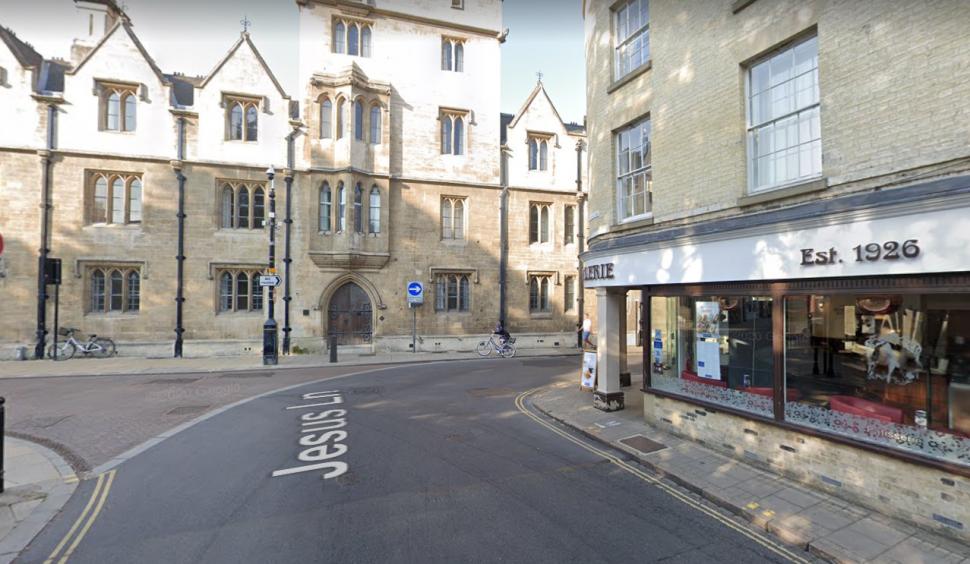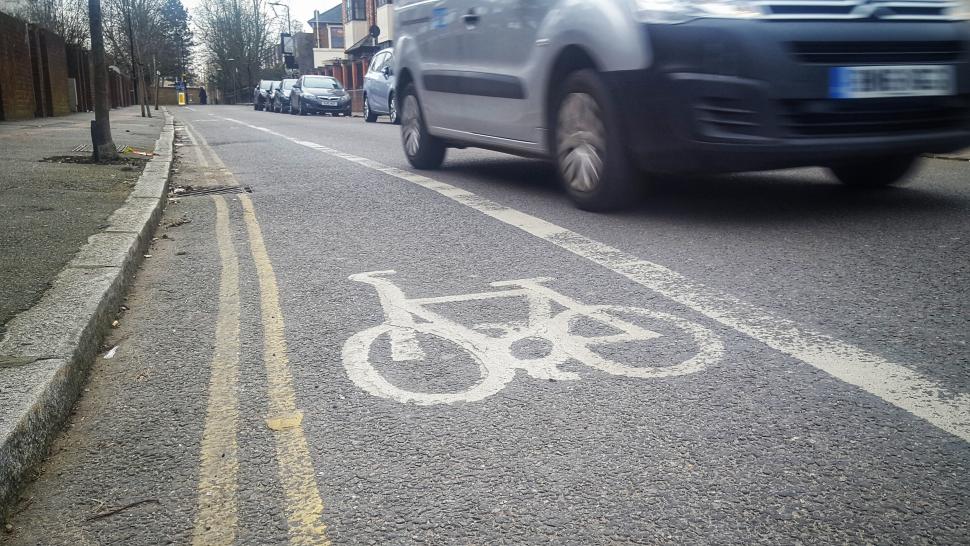- News
- Reviews
- Bikes
- Accessories
- Accessories - misc
- Computer mounts
- Bags
- Bar ends
- Bike bags & cases
- Bottle cages
- Bottles
- Cameras
- Car racks
- Child seats
- Computers
- Glasses
- GPS units
- Helmets
- Lights - front
- Lights - rear
- Lights - sets
- Locks
- Mirrors
- Mudguards
- Racks
- Pumps & CO2 inflators
- Puncture kits
- Reflectives
- Smart watches
- Stands and racks
- Trailers
- Clothing
- Components
- Bar tape & grips
- Bottom brackets
- Brake & gear cables
- Brake & STI levers
- Brake pads & spares
- Brakes
- Cassettes & freewheels
- Chains
- Chainsets & chainrings
- Derailleurs - front
- Derailleurs - rear
- Forks
- Gear levers & shifters
- Groupsets
- Handlebars & extensions
- Headsets
- Hubs
- Inner tubes
- Pedals
- Quick releases & skewers
- Saddles
- Seatposts
- Stems
- Wheels
- Tyres
- Health, fitness and nutrition
- Tools and workshop
- Miscellaneous
- Tubeless valves
- Buyers Guides
- Features
- Forum
- Recommends
- Podcast
 Cambridge cyclist (Google Maps)
Cambridge cyclist (Google Maps)"Accident waiting to happen": Cambridge University fellow urges students to follow Highway Code and end "tradition" of ignoring one-way system
A University of Cambridge fellow has spoken out about students ignoring traffic rules in the city, saying the "tradition" of flouting the one-way system is an "accident waiting to happen".
Hughes Hall fellow Peter Britton told Cambridgeshire Live he had taken the matter up with the university's acting vice chancellor, Anthony Freeling, but was told it is not the university's job to "lecture students" about traffic rules.
Mr Britton — a fellow and honorary director of music at the Cambridge college since 2006 — suggested there is a "sort of tradition" of students ignoring the one-way system on and around Bridge Street "for time immemorial".
"I want to emphasise I'm not a vigilante, I can understand anyone on a bike would tend to think 'well, let's go as the crow flies'," he told the local news outlet.
"But now there are people on electric bikes and scooters and you get huge buses and delivery vans swinging into Bridge Street by Patisserie Valerie. That's why I think that on that corner it's an accident waiting to happen.
"There's this sort of tradition, I guess. Especially of colleges that are along those roads, whether it's Trinity or John's or Sidney Sussex, that for time immemorial they've gone both ways."
And while Mr Britton says he is "sympathetic" with the police who lack the "manpower" necessary he hopes university colleges might talk to students as "part of their duty of care".
"One simple suggestion is that the colleges, as part of their duty of care — which they're now much more conscious of — would very gently point out to students, especially new students, that they're expected to obey the Highway Code," the fellow continued.
"Just leave it at that and why it's necessary for public safety. It occurred to me to write to him [acting vice chancellor Anthony Freeling] and suggest that he could raise it at a meeting of all the heads of colleges, at least to make sure students are aware there is a one-way system.
"But he replied and said he could appreciate it but he didn't think it was their job to lecture students."
A university spokesperson said: "The University of Cambridge urges all members of its community to follow The Highway Code, and to cycle, ride and drive safely."
"Contraflow cycling does not increase cyclist crash or casualty rates"
Interestingly, the University of Cambridge fellow's comments come just days after road.cc first became aware of an academic paper from the University of Leeds which looked at 22 years of data from 508 one-way streets and found that "contraflow cycling does not increase cyclist crash or casualty rates".
The paper, titled 'Contraflows and cycling safety: Evidence from 22 years of data involving 508 one-way streets' to be published in January's volume of Accident, Analysis & Prevention also found that crash rates are "identical" whether the cyclist is travelling with flow or contraflow.
It recommended "all UK one-way streets should be evaluated to allow contraflow cycling" and concluded that "legislation mandating two-way cycling would improve cycling networks and routes".
The most recent comment about students ignoring one-way street signs is not the first cycling-related University of Cambridge row this autumn as a plan to introduce a £5 congestion charge on weekday car journeys into the city prompted predictable cries of town and gown conflict.
While downplayed by many, including the university who said many staff drive into the city, some from a local residents' group suggested the move would only benefit Cambridge's bike-riding students and staff.
Dan is the road.cc news editor and joined in 2020 having previously written about nearly every other sport under the sun for the Express, and the weird and wonderful world of non-league football for The Non-League Paper. Dan has been at road.cc for four years and mainly writes news and tech articles as well as the occasional feature. He has hopefully kept you entertained on the live blog too.
Never fast enough to take things on the bike too seriously, when he's not working you'll find him exploring the south of England by two wheels at a leisurely weekend pace, or enjoying his favourite Scottish roads when visiting family. Sometimes he'll even load up the bags and ride up the whole way, he's a bit strange like that.
Latest Comments
- Capt Sisko 1 min 49 sec ago
My gut feeling when I hear calls like this is that the proposers want all the speed & convenience of a motorbike, but without any of the hassle...
- Sriracha 2 sec ago
Pretty sure the Police often post their own official signs basically saying the same thing....
- Rendel Harris 11 min 5 sec ago
It's not uncommon for there to be a delay between paying with a debit or credit card and the money being taken from one's account, particularly if...
- AidanR 14 min 8 sec ago
Yup, Kristen Faulkner was DQ´d for wearing a Libre CGM. You´re right that the UCI has a blanket ban on such technology, although it´s not clear why...
- Rendel Harris 24 min 42 sec ago
Yes, he claims to have been a copper over here and then moved to Australia; he frequently displays a total ignorance of the law which presumably...
- hawkinspeter 28 min 22 sec ago
They've got some changes planned for further along Queens Road too - that looks very different from the current roundabout.
- mdavidford 47 min 27 sec ago
How about this kind of arrangement?
- chrisonabike 1 hour 27 min ago
It's been a long time since I travelled in either. I should go back and collect some fresh data. All I can say now is that Belgian infra a decade...
- David9694 2 hours 3 min ago
I'm not a vegan, but I think the vegans are right. Stop exploiting animals for food and for your entertainment. ...
- David9694 2 hours 27 min ago
Drink driver six times over the limit sentenced after crashing car into house in Broad Street, Sheerness...


Add new comment
7 comments
"But he replied and said he could appreciate it but he didn't think it was their job to lecture students."
Really? What do they do all day?
Quite surprised to see that even an *acting* Oxbridge Vice Chancellor is such a milquetoast, and is soft-pedalling the duty of care he owes his students.
But then the place has always been full of highly intelligent very stupid people.
Whilst rules are rules, of all the road safety issues to have a bee in one's proverbial bonnet about, I'm not sure why Mr Britton has latched onto this one. It's not really an issue.
Large vehicles do come round there sometimes, but because the corner is quite tight they have to swing round wide and slow, which means there is normally plenty of time to avoid a collision. The area is also central enough that there are always plenty of pedestrians about too, sometimes in the road thanks to narrow pavements, so drivers do tend to be fairly cautious. Certainly if you look at sites like Crash Map, I would say there is no evidence that that corner (or the one way system around there in general) is a hotspot for collisions with cyclists - if anything the opposite, especially considering the number of cyclists on those roads.
There are also numerous other locations with legitimate cycle contraflows where the risk seems similar - for example the corner between King Street and Hobson Street, or between Wheeler Street and Corn Exchange Street. There are also some streets which are very narrow with tight corners, but two-way to all vehicles (e.g. Trinity Lane).
And there are plenty of other spots around Cambridge where there seems to be far more cause for concern, such as some of the roundabouts, major road junctions and busy, narrow roads (e.g. Mill Road). But I guess it's easier to whinge about naughty students than campaign about issues that might actually make a difference (see e.g. https://www.camcycle.org.uk/blog/2021/10/no-more-lives-must-be-lost-we-n... and https://road.cc/content/news/233529-tributes-paid-%E2%80%9Cgiant-conserv... )
Maybe it would be good use of relativily little funds to sign the de facto contraflows, as per the paper, so reducing the claims that all bicyclists are law-breakers, and motorists etc would be warned.
"all UK one-way streets should be evaluated to allow contraflow cycling" and concluded that "legislation mandating two-way cycling would improve cycling networks and routes"
This works really well in Paris.
There's a few one-way roads in Bristol that have a bit of magic paint to allow contraflow cycling. That should happen by default unless there's a specific reason why it might be dangerous.
Like many good concepts from more transport-enlightened places, I'd agree but note that it might be a bit early for the UK without abundant caution.